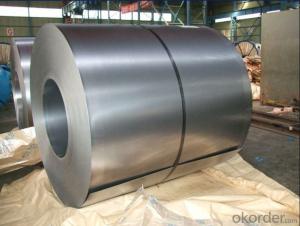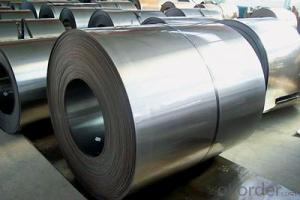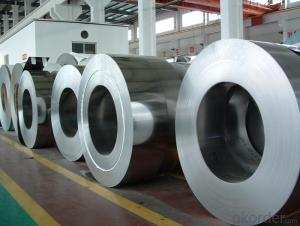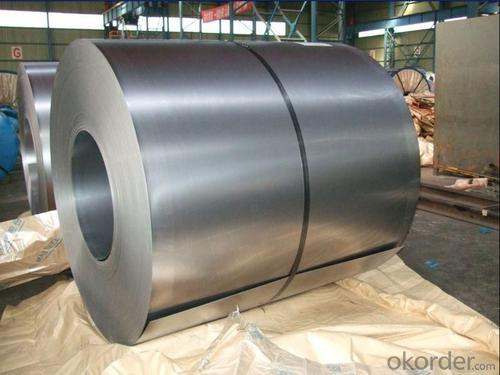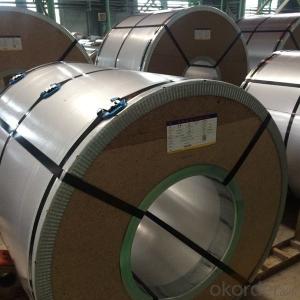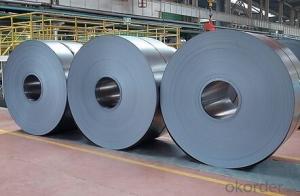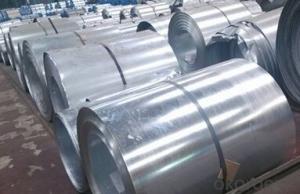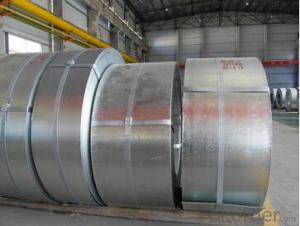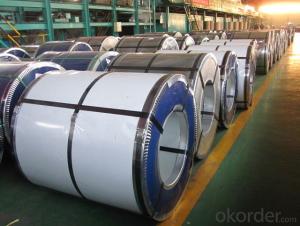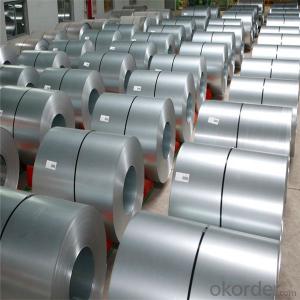Cold Rolled Steel Sheet Coil JIS G3302 EN10142 ASTM653 ASTM95
- Loading Port:
- China main port
- Payment Terms:
- TT or LC
- Min Order Qty:
- 25 m.t.
- Supply Capability:
- 100000 m.t./month
OKorder Service Pledge
OKorder Financial Service
You Might Also Like
Product Name | Cold Rolled Sheet Coil |
Material | SPCC/SPCD/SPCE/DC01/ST12/ ST14/SPCD/DC03/DC04 ect. |
Grade Standard | JIS G3302, EN10142, ASTM653, ASTM95 |
Thickness | 0.15-3.5mm |
Width | 200mm-1500mm |
Coil ID | 508-610mm |
Coil OD | max 1500mm |
Weight | 3-15 Tons |
Tolerance | Thickness tolerance:+/-0.02mm; Width tolerance:+5mm -0mm |
Surface Treatment | Oiled / Unoiled |
Annual Output | 350,000MT |
Application | Construction, hardware, home applicances, interior decoration |
General Application of Cold Rolled Steel Coil:
Classification | Designation | Characteristics | Main applications |
Commercial Quality | SPCC SPCCT | Commercial quality suitable for bending fabrication and simple forming; this is the type in greatest demand. | Refrigerators, cabinets, power distribution baords and drums. |
Drawing Quality | SPCD | Drawing quality second only to that of SPCEN. Excellent uniformity. | Automobile floor and roof panels. |
Deep-drawingQuality | SPCE SPCF | Deep-drawing quality.With metallurgically controlled grain size, it retains its beautiful finish even after being deep-drawn. | Automobile fenders and quarter panels |
Extra deep-drawing Quality | SPCG | Extra-low-carbon steel sheets with highest workability | Automobile internal panels and deep-drawn parts |
Chemical Components
Grade | Chemical Components | ||||
C | Mn | P | S | Alt | |
St12 | ≤0.10 | ≤0.50 | ≤0.035 | ≤0.025 | ≥0.020 |
St13 | ≤0.08 | ≤0.45 | ≤0.030 | ≤0.025 | ≥0.020 |
St14 | ≤0.08 | ≤0.40 | ≤0.025 | ≤0.020 | ≥0.020 |
Mechanical Properties
1. Yield Strength: ≤320MPa
2. Tensile Strength: ≤370MPa
3. Elongation (L=50mm, b=25mm) When:
(1) Nominal Thickness <0.25mm: 30%
(2) Nominal Thickness 0.25mm-<0.40: 32%
(3) Nominal Thickness 0.40-<0.60mm: 34%
(4) Nominal Thickness 0.60-<1.0mm: 36%
(5) Nominal Thickness 1.0-<1.6mm: 37%
(6) Nominal Thickness >1.6mm: 38%
- Q: What are the factors affecting the lifespan of steel coils?
- The lifespan of steel coils can be influenced by various factors. To begin with, the quality of the steel utilized in the coil manufacturing process plays a significant role. Steel of high quality, possessing appropriate composition and metallurgical properties, tends to have a longer lifespan in comparison to lower-quality steel. Moreover, the environment in which the steel coils are stored and utilized also impacts their longevity. Exposure to extreme temperatures, humidity, and corrosive substances can result in the degradation and corrosion of the coils, ultimately reducing their lifespan. To prolong the lifespan of the coils, it is crucial to maintain proper storage conditions, including controlled temperature and humidity levels. Additionally, the handling and transportation of steel coils can have an effect on their lifespan. Mishandling, such as dropping or improper loading and unloading, can lead to physical damage, causing premature failure of the coils. Similarly, rough transportation conditions characterized by excessive vibration or impact can contribute to coil deterioration and a reduction in their lifespan. Furthermore, the maintenance and care of the steel coils also play a role in determining their lifespan. Regular inspections, cleaning, and maintenance practices aid in the identification and resolution of potential issues before they escalate into major problems. Moreover, applying protective coatings or treatments to the coils can prevent corrosion and extend their lifespan. In summary, the lifespan of steel coils is influenced by a combination of factors, including steel quality, storage conditions, handling and transportation, and maintenance practices. It is essential to consider these factors and implement appropriate measures to ensure the longevity of the coils.
- Q: How are steel coils used in the manufacturing of construction excavators?
- Steel coils are often used in the manufacturing of construction excavators to form the structural components and body parts. These coils are cut, shaped, and welded to create the framework, bucket, and other essential components of the excavator. The high strength and durability of steel make it an ideal material for supporting heavy loads and withstanding the demanding conditions of construction sites.
- Q: I know that steel is generally iron with carbon and probably some other things in it, but I'm doing a research paper on architecture in Tokyo, and touching on the Tokyo Tower.The Tokyo work is larger than the Eiffel Tower by 12 meters, but lighter by 3000 tons. The only reason I can find for the difference in weight is that the Tokyo Tower is made of steel and the Eiffel Tower in made of iron, and since the Tokyo Tower is modeled after the Eiffel, there's really not a substantial difference in the amount of metal used....
- Steel Lighter
- Q: Is there any noticable or perceived difference between smoking out of a pipe with a brass screen and a stainless steel screen?
- Stainless Steel Pipe Screens
- Q: How are steel coils inspected for impact resistance?
- Steel coils are inspected for impact resistance through various methods including conducting visual inspections, performing non-destructive testing such as ultrasonic testing and magnetic particle inspection, and conducting drop tests to simulate real-life impact scenarios. These inspection techniques help ensure that the steel coils meet the required standards and can withstand potential impacts during transportation, handling, and usage.
- Q: How are steel coils used in the manufacturing industry?
- Steel coils are used in the manufacturing industry for a variety of purposes, including the production of various steel products such as automotive parts, construction materials, household appliances, and machinery components. These coils are often processed and formed into desired shapes through techniques like cutting, bending, and welding to create finished products that are durable, strong, and suitable for various applications in different sectors.
- Q: How are steel coils used in the manufacturing of tubes?
- Steel coils are used in the manufacturing of tubes by being processed through a series of steps such as slitting, forming, and welding. These coils are slit into narrower strips, which are then formed into a cylindrical shape and welded together. This process allows for the efficient production of seamless or welded tubes, which can be used in various industries such as construction, automotive, and oil and gas.
- Q: I need to know the density of steel as one of my physical properties of steel. Any answers? If u have more physical or chemical properties of steel, that would help to thanks.
- It depends on what kind of steel it is. Martensitic steel has a lower density than austenitic steel. However, a good number for a typical steel is 0.286 pounds per cubic inch (7.92 grams per cubic centimeter).
- Q: How are steel coils used in the manufacturing of airbags?
- Steel coils are used in the manufacturing of airbags as they provide the necessary structural support and strength to ensure the airbags deploy effectively during a collision. The coils are typically placed within the airbag module to help maintain its shape and prevent it from collapsing on impact, ensuring the airbag can rapidly inflate to protect occupants in a vehicle.
- Q: How are steel coils inspected for yield strength?
- Steel coils are inspected for yield strength through a series of testing methods. The most common and widely used method is the tensile test. In this test, a small sample is taken from the steel coil and subjected to a controlled load until it reaches its yield point. During the tensile test, the sample is gradually stretched until it deforms and ultimately breaks. The load and elongation data are continuously recorded during this process. The yield strength is then determined by identifying the point on the stress-strain curve where the material begins to exhibit plastic deformation or permanent elongation. Another method used to inspect steel coils for yield strength is the hardness test. Hardness is often correlated with yield strength, and therefore, a hardness test can provide an estimation of the material's yield strength. This test involves measuring the resistance of the steel coil's surface to indentation or penetration using instruments like a Rockwell or Brinell hardness tester. Additionally, non-destructive testing methods such as ultrasonic testing and magnetic particle inspection can also be employed to evaluate yield strength. Ultrasonic testing involves the use of high-frequency sound waves to detect any internal defects or inconsistencies in the material's structure. Magnetic particle inspection, on the other hand, relies on the application of magnetic fields and the use of magnetic particles to identify surface cracks or defects. Overall, various testing methods are available to inspect steel coils for yield strength. These methods provide manufacturers and inspectors with valuable information about the quality and performance capabilities of the steel, ensuring that it meets the required standards and specifications.
Send your message to us
Cold Rolled Steel Sheet Coil JIS G3302 EN10142 ASTM653 ASTM95
- Loading Port:
- China main port
- Payment Terms:
- TT or LC
- Min Order Qty:
- 25 m.t.
- Supply Capability:
- 100000 m.t./month
OKorder Service Pledge
OKorder Financial Service
Similar products
Hot products
Hot Searches
Related keywords
